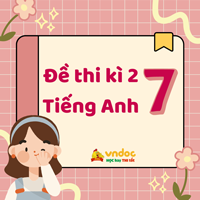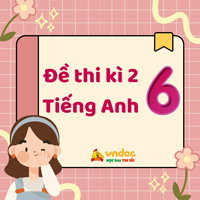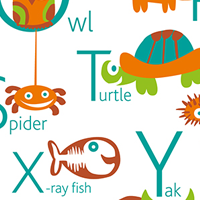Kiểm tra tiếng Anh lớp 9 Unit 7 Recipes And Eating Habits
Bài tập tiếng Anh Unit 7 lớp 9 Recipes and Eating habits
Đề kiểm tra 45 phút tiếng Anh lớp 9 Unit 7 Recipes and Eating habits có đáp án nằm trong bộ đề Ôn tập Tiếng Anh lớp 9 theo từng Unit năm học 2023 - 2024 do VnDoc.com sưu tầm và đăng tải. Trắc nghiệm Unit 7 lớp 9 có đáp án bao gồm nhiều dạng bài tập Tiếng Anh lớp 9 chương trình mới khác nhau giúp học sinh lớp 9 ôn tập kiến thức đã học hiệu quả.
I. Find the word which has a different sound in the part underlined.
| 1. A. tender | B. garnish | C. drain | D. sprinkle |
| 2. A. grill | B. garnish | C. dip | D. slice |
| 3. A. head | B. spread | C. cream | D. bread |
| 4. A. sauce | B. steam | C. sugar | D. stew |
| 5. A. marinate | B. grate | C. shallot | D. staple |
II. Choose the word which has a different stress pattern from the others.
| 1. A. tomato | B. nutritious | C. ingredient | D. tablespoon |
| 2. A. ingredient | B. traditional | C. repeat | D. avocado |
| 3. A. celery | B. benefit | C. engineer | D. versatile |
| 4. A. tender | B. simmer | C. cucumber | D. delicious |
| 5. A. significant | B. diverse | C. garnish | D. combine |
III. Complete the sentences with a, an, some or any
1. There is …………..banana in the basket.
2. I need ……………tea.
3. Are there ……………..tomatoes in the fridge?
4. We have ……………..rice but we don’t have ……………..meat.
5. There’s ………orange on the table.
6. I’d like…………………apple juice.
7. He has ………….TV and …………………computer.
8. Would you like ……………..ice cream?
9. I have ………………..friends in Hue.
10. Do you have …………dogs or cats at home?
1. There is ……a……..banana in the basket.
2. I need ……some………tea.
3. Are there ………any……..tomatoes in the fridge?
4. We have ……some………..rice but we don’t have ……any………..meat.
5. There’s ……an…orange on the table.
6. I’d like………some…………apple juice.
7. He has ……a…….TV and ………a…………computer.
8. Would you like ………some……..ice cream?
9. I have …………some……..friends in Hue.
10. Do you have ……any……dogs or cats at home?
IV. Put the verbs in brackets into the correct tenses of the conditionals.
1. If you …………………(not go) away, I’ll send for the police.
2. I’ll be very angry if he ……………………(make).
3. If he …………….(be) late we’ll go without him.
4. She will be absolutely furious if she …………………(hear) about this.
5. If you put on the kettle, I ………………(make) the tea.
6. If you give my dog a bone, he …………….(burry) it at once.
7. If we leave the car here it …………………..(not, be) in anybody’s way.
8. He’ll be late for the train if he …………………(not start) at once.
9. If you come late they ……………(not let) you in.
10. If he ………………(go) on telling lies nobody will believe a word he says.
1. If you ………don't go…………(not go) away, I’ll send for the police.
2. I’ll be very angry if he ……………makes………(make).
3. If he ………is…….(be) late we’ll go without him.
4. She will be absolutely furious if she ………hears………(hear) about this.
5. If you put on the kettle, I ……will make…(make) the tea.
6. If you give my dog a bone, he …will burry………….(burry) it at once.
7. If we leave the car here it …………won't be………..(not, be) in anybody’s way.
8. He’ll be late for the train if he ………doesn't start…………(not start) at once.
9. If you come late they ……won't let………(not let) you in.
10. If he ……goes…………(go) on telling lies nobody will believe a word he says.
V. Choose the best answers.
1. Some of famous ……………in Southern Viet Nam are Hu Tieu Nam Vang , Bun Mam, fried rice, flour cake and many kinds of pudding
A. stapes B. ingredients C. foods D. dishes
2. Beet greens are the most …………….part of the vegetable and can be cooked like any other dark leafy green.
A. traditional B. careful C. colourful D. nutritious
3. It is boring here. ………………….ever happens in this place.
A. Anything B. Something C. Things D. Nothing
4. Moderation doesn’t mean……………….the foods you love.
A. to prevent B. preventing C. to eliminate D. eliminating
5. You should eat more fruits and vegetables if you …………….to lose weight.
A. would want B. wanted C. will want D. want
6. When we were on holiday, we spend too ………….money.
A. a lot of B. many C. much D. lots of
7. If people work so much, they …………….depressed and eat more.
A. may feel B. may have felt C. felt D. had felt
8. Studies suggest ……………..only when you are most active and giving your digestive system a long break each day.
A. eating B. being eating C. to eat D. being eaten
9. There ___________ at the door.
A. is somebody B. is anybody C. is everybody D. isn’t nobody
10. Perhaps the three most popular ice cream…………….are vanilla, chocolate and strawberry.
A. offers B. flavours C. brands D. ingredients
11. I spend ………………my spare time gardening.
A. most B. the most of C. most of D. most of the
12. Your body uses calcium to build healthy bones and teeth, …………..them strong as your age.
A. continue B. keep C. remain D. care
13. Food in Northern Viet nam is not as ………..as that in Central and Southern Viet nam , as black pepper is often used rather than chilies.
A. spicy B. exciting C. strong D. flavour
14. Pumpkin soup is a good source of ……………, minerals and vitamins, especially vitamin A.
A. fibres B. fats C. sugar D. solids
15. There’s ………….use in complaining. They probably won’t do anything about it.
A. a few B. a little C. no D. some
16. If you eat too quickly you may not ……………..attention to whether your hunger is satisfied.
A. keep B. show C. pay D. take
17. Another feature in northern cuisine is in winter all family members gather around a big hotpot …………….there is a combination of seasoned broth, vegetables and meat.
A. what B. when C. which D. in which
18. You …………..chicken. you cook it in an oven or over a fire without liquid.
A. fry B. roast C. steam D. boil
19. ………………cups of coffee have you taken.?
A. How many B. How much C. How D. How far
20. Common eating habits that can lead to …………….are: eating too fast, eating when not hungry, eating while standing up, and skipping meals.
A. put on weight B. be heavy C. gain weight D. weight gain
21. We didn’t buy …………flowers yesterday.
A. some B. many C. much D. any
22……………tall you've grown!
A. What B. How C. How much D. How many
23. Most of the pupils are ................... to pass the examination.
A. good enough B. too good C. very good D. good too
24. They felt happy, and ………… did I.
A. either B. neither C. too D. so
25. If any body …………a question, please ask me after class.
A. has B. have C. to have D. had
1 - D; 2 - D; 3 - D; 4 - D; 5 - D;
6 - C; 7 - A; 8 - A; 9 - A; 10 - D;
11 - C; 12 - B; 13 - A; 14 - C; 15 - C;
16 - C; 17 - D; 18 - B; 19 - A; 20 - A;
21 - D; 22 - B; 23 - A; 24 - D; 25 - A;
VI. Identify the one underlined word or phrase that must be changed to make the sentence correct.
1. If (A) someone came (B) into the store, smile (C) and say, “ May (D) I help you?”
2. If (A) you try (B) these comestics, you look (C) five years younger (D).
3. If (A) you do not understand (B) what were written (C) in the book, you could ask (D) Mr,Pike.
4. I will come (A) to meet Mr. Pike and tell him about (B) your problems if (C) you didn’t solve (D) them yourself.
5. Sam will not (A) graduate unless (B) he doesn’t pass (C) all the (D) tests.
6. If (A) there isn’t (B) enough food (C), we couldn’t continue (D) our journey.
7. Unless (A)you pour (B) oil on (C) water, it will float (D).
8. You have to (A)take (B) a taxi home if (C) you want to leave (D) now.
9. If (A) anyone will phone (B), tell (C) them I’ll be (D) back at 11:00
10. We can hire (A) a minibus (B) if (C) there will be (D) enough people.
1 - B; 2 - C; 3 - D; 4 - D; 5 - C;
6 - D; 7 - A; 8 - A; 9 - B; 10 - D;
VII. Complete the second sentence in each pair so that it has similar meaning to the first sentence using “you”
1. Vegetarians don’t eat meat.
If you are a vegetarian, ………………………
2.People who live in a cold country don’t like hot weather.
If you live………………………………………………………
3. Teachers have to work very hard.
If you are a teacher, …………………………………………..
4. People who do a lot of exercise stay fit and healthy.
If you ………………………………………………………..
5. Mechanics understand engines.
If you are a ……………………………………………………..
6. People who read newspapers know what’s happening in the world.
If you ………………………………………………………………………
1 - If you are a vegetarian, you won't eat meat.
2 - If you live in a cold country, you won't like hot weather.
3 - If you are a teacher, you will have to work very hard.
4 - If you do a lot of exercise, you will stay fit and healthy.
5 - If you are a mechanic, you will understand engines.
6 - If you read newspapers, you will know what’s happening in the world.
VIII. Complete the second sentence in each pair so that it has similar meaning to the first sentence
1.Eating healthy foods is very important.
It is ………………………………………………………………
2. I suggest having spaghetti and pizza tonight.
Let’s……………………………………………………………….
3. You need to peel the onion and slice it.
The onion………………………………………………………….
4. Follow these safety instructions or you may get burnt.
If you …………………………………………………………….
5. My aunt has never tasted sushi before.
This is ………………………………………………………………..
1 - It is very important to eat healthy foods.
2 - Let's have spaghetti and pizza tonight.
3 - The onion need to be peeled and sliced.
4 - If you don't follow these safety instructions, you may get burnt.
5 - This is the first time my aunt tasted sushi.
IX. Read the text, and identify whether the statements are true (T), false (F) or or not given (NG).
Australia is a huge country and it has a lot of different kinds of food. In the past, the Aboriginal people of Australia ate animals like crocodiles and some insects like the witchetty grub. Aboriginal Australians travelled around the Australian countryside, or ‘bush’, to find food.
When the first British and Irish people moved to Australia in the 1830s, they brought sheep and cows from Europe. They also brought traditional English and Irish recipes. Many of these recipes, like fish and chips and meat pies, are still popular today. They also created new Australian recipes such as the pavlova (a fruit dessert - named after a Russian dancer) and damper (a bread cooked in the bush).
After 1945, a lot of people came to live in Australia fromcountries like Italy, Germany, Greece, Thailand and India. They brought recipes with them and Australians began to eat and drink different things. People started to drink espresso coffee and eat Mediterranean and Asian food.
A lot of modern Australians love cooking with fresh food. They often cook food on barbecues in their gardens or on the beach. Today more people also eat Aboriginal food like kangaroo and emu. Mark Olive, an Aboriginal chef, has a popular TV cookery programme about traditional bush food. There are always new recipes to try in Australia!
1. Australia doesn’t have many different types of food.
2. In the past, Aboriginal people found food in different places.
3. British and Irish people brought food and recipes to Australia.
4. The people who arrived after 1945 didn’t like Australian food.
5. Australians like food from countries like Italy, Greece, and Thailand.
6. Cooking outside is popular in Australia.
7. Today many people in Australia eat crocodile.
1. F | 2. T | 3. T | 4. NG | 5. NG | 6. T | 7. NG |
Mời bạn đọc tải trọn bộ nội dung đề thi tại đây: Kiểm tra Tiếng Anh lớp 9 Unit 7 Recipes And Eating Habits. Ngoài ra, VnDoc.com đã cập nhật rất nhiều tài liệu ôn tập Tiếng Anh lớp 9 Unit 7 khác nhau như: Bài tập Tiếng Anh lớp 9 Unit 7 Recipes And Eating Habits, Từ vựng Tiếng Anh lớp 9 Unit 7 Recipes And Eating Habits, Bài tập nâng cao Tiếng Anh lớp 9 Unit 7 Recipes And Eating Habits.
Bên cạnh đó, VnDoc.com có rất nhiều tài liệu ôn tập Tiếng Anh lớp 9 cả năm khác như: Để học tốt Tiếng Anh lớp 9, Bài tập Tiếng Anh lớp 9 theo từng Unit trực tuyến, Đề thi học kì 1 lớp 9, Đề thi học kì 2 lớp 9, Bài tập nâng cao Tiếng Anh 9,.. Mời bạn đọc tham khảo, download phục vụ việc học tập, giảng dạy.
Bên cạnh việc tương tác với VnDoc qua fanpage VnDoc.com, mời bạn đọc tham gia nhóm học tập tiếng Anh lớp 9 cũng như tiếng Anh lớp 6 - 7 - 8 tại group trên facebook: Tiếng Anh THCS.


















